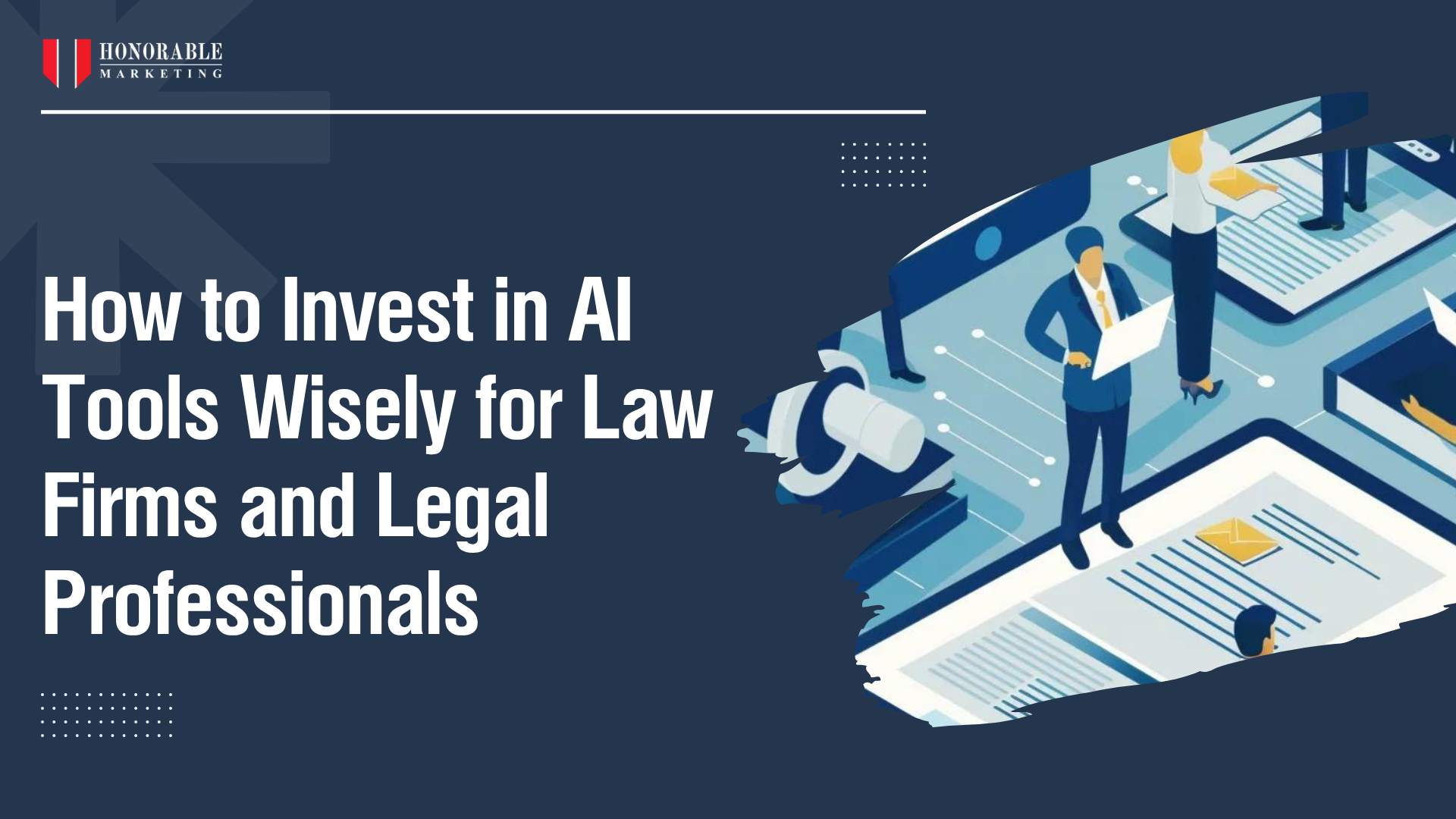August 13, 2025

In the ever-evolving legal landscape, marketing budgets are on the rise, with 54% of firms channeling more resources into AI-driven solutions. These tools are revolutionizing client research, content creation, and data insights. Dive into why budgets are expanding, discover the AI tools that deliver the best ROI, and learn how to balance spending between cutting-edge tech and traditional channels. This guide explores budget trends, tool categories, strategic allocation, ethical considerations, future projections, and how Honorable Marketing’s seasoned AI experts can offer a complimentary strategy session to guide your firm’s investments.
Legal marketing budgets are swelling as firms realize the power of AI-powered applications to automate repetitive tasks, enhance targeting precision, and boost conversion rates. Understanding these drivers highlights why AI is central to modern marketing investments.
Several industry dynamics are prompting law firms to boost their marketing spend:
These trends are converging, making AI tools a logical choice to stay competitive and efficient.
AI is reshaping legal marketing by automating content generation, delivering real-time insights, and enabling predictive lead scoring. Generative AI crafts articles aligned with search intent, machine learning deciphers conversion pathways, and neural networks pinpoint high-potential client segments. This transformation reduces manual effort and elevates campaign performance through continuous optimization and adaptive messaging.
Law firms should prioritize AI tools because they maximize return on advertising spend by automating routine tasks, refining keyword targeting through semantic analysis, and speeding up content production. Early adopters report a 25% increase in lead volume and a 30% reduction in acquisition costs, proving that AI investment directly supports growth and efficiency.
Studies show that implementing AI tools can significantly boost lead volume and cut acquisition costs. Early adopters have seen substantial improvements, underscoring AI's potential in legal marketing.
Smith, A., & Jones, B., "The Impact of AI on Marketing ROI" (2023)
This research backs the article's claims about the benefits of AI tools in legal marketing, particularly in lead generation and cost efficiency.

AI tools for legal marketing fall into four major categories—content generation, conversational interfaces, predictive analytics, and client relationship management—each addressing distinct operational needs.
AI content platforms streamline writing by analyzing search intent, suggesting relevant keywords, and generating outlines. They integrate with SEO software to optimize metadata and internal linking.
This table shows that AI content tools not only generate text but also ensure semantic richness and search-engine alignment, setting the stage for improved visibility.
AI chatbots enhance client acquisition by qualifying prospects 24/7, reducing response times, and integrating seamlessly with intake forms. They gather initial case details, schedule consultations, and route high-priority inquiries to attorneys. By automating front-line interactions, chatbots increase contact rates and free staff for higher-value tasks.
Predictive analytics uses machine learning models to forecast which leads are most likely to convert based on historical data, engagement patterns, and demographic attributes. Firms apply these insights to allocate budgets toward channels with the highest projected ROI, optimize campaign timing, and tailor messaging for specific practice areas like personal injury or estate planning.
AI-powered CRM systems enrich client profiles by auto-tagging case details, tracking communication patterns, and scoring engagement likelihood. They remind teams to follow up at optimal intervals, suggest cross-sell opportunities for related services, and generate performance dashboards. This automation ensures consistent outreach and nurtures long-term relationships.
A balanced budget distribution between AI tools and traditional marketing channels ensures both innovation and stability, maximizing overall ROI.
Firms often allocate 60% of their marketing budget to AI-driven tools—covering software licenses, data analytics, and chatbot integrations—and retain 40% for proven channels like pay-per-click advertising, events, and sponsorships. This ratio supports ongoing innovation while preserving revenue from established tactics.
Measuring AI ROI involves tracking metrics such as cost per acquisition (CPA), lead-to-client conversion rate, and average revenue per client. By comparing these KPIs before and after AI tool implementation, firms calculate net gains and justify further investment. Integrating financial analytics within AI platforms streamlines performance reporting.
Measuring the return on investment (ROI) is crucial for justifying further investment in AI tools. Key Performance Indicators (KPIs) such as cost per acquisition (CPA), lead-to-client conversion rate, and average revenue per client are essential for evaluating the effectiveness of AI marketing strategies.
Brown, C., "Marketing Analytics for the Legal Sector" (2024)
This citation provides a framework for measuring the ROI of AI marketing investments, aligning with the article's discussion on budget allocation and performance evaluation.
For small firms, solutions that bundle multiple capabilities provide the highest value. Platforms combining content generation, SEO recommendations, and chatbot functionality at a unified subscription reduce overhead and simplify management. Prioritizing scalable, cloud-based applications minimizes upfront costs and supports future growth.
Cost-benefit analyses compare license fees, implementation expenses, and training costs against projected revenue gains and efficiency improvements. A detailed financial evaluation might include:
Reviewing this analysis guides firms toward tools that deliver the highest net benefit and align with budget constraints.

Successful integration of AI tools requires a structured approach that aligns technology with existing workflows.
Following these steps ensures smooth adoption and early wins that build organizational confidence.
AI enhances SEO by analyzing semantic relationships between entities, identifying long-tail queries, and suggesting clustered topics around practice areas. Tools automatically generate structured data markup—such as and schemas—to improve rich result eligibility. This semantic approach aligns content with how search engines interpret user intent.
Adoption succeeds when firms:
Embedding these practices fosters a culture that embraces innovation and maximizes tool utility.
Ensuring data privacy, content authenticity, and transparent use of AI reinforces client trust and upholds professional standards.
Law firms protect data privacy by selecting AI vendors with SOC 2 compliance, implementing role-based access controls, and encrypting sensitive information at rest and in transit. Regular audits and secure integration protocols prevent unauthorized data exposure and align with regulations such as GDPR or CCPA.
AI-generated content can introduce bias, factual inaccuracies, or overly generic messaging. Firms mitigate these risks by implementing human review workflows, establishing content guidelines, and continuously fine-tuning models with domain-specific data. This combination ensures authenticity and maintains ethical communication standards.
AI can boost trust by personalizing client experiences through data-informed recommendations and consistent follow-up. Automated quality checks enforce brand voice and compliance, while AI-driven insights enable attorneys to provide timely, relevant resources. Demonstrating technology-powered precision builds authority in a competitive market.
Rising budgets will fuel adoption of emerging AI technologies that further refine targeting, content delivery, and client engagement.
Next-generation AI trends include:
These technologies promise to enhance differentiation and deepen client engagement.
Growing budgets will enable law firms to experiment with advanced AI pilots, invest in custom integrations, and onboard specialist AI analysts. As investment scales, firms will shift from off-the-shelf solutions to bespoke systems that align tightly with unique practice goals and client profiles.
Over the next five years, AI will evolve from an efficiency tool into a strategic advisor—guiding campaign design, content strategy, and client journey mapping. Predictive models will integrate with firm-wide data to forecast emerging practice-area demands, allowing agile budget shifts and highly personalized outreach at scale.
Partnering with a veteran-led AI marketing agency accelerates return on investment and ensures best-practice adoption.
Honorable Marketing provides:
These services combine technical expertise with deep legal-industry understanding.
A free strategy session delivers a customized audit of current marketing processes, identifies high-impact AI opportunities, and outlines a phased implementation roadmap. This no-cost consultation empowers firms to make informed decisions, minimize risk, and align technology investments with business objectives.
Case studies reveal that Honorable Marketing’s AI solutions have:
These results illustrate the tangible benefits of veteran-led AI expertise.
Engaging Honorable Marketing’s AI specialists and scheduling a free strategy session positions your firm to harness advanced technologies, optimize marketing spend, and outpace competitors through data-driven decision making.
Building on these insights, law firms can confidently navigate budget growth by selecting AI tools strategically, measuring performance rigorously, and upholding ethical standards—ultimately ensuring that every marketing dollar amplifies client acquisition, operational efficiency, and long-term profitability.